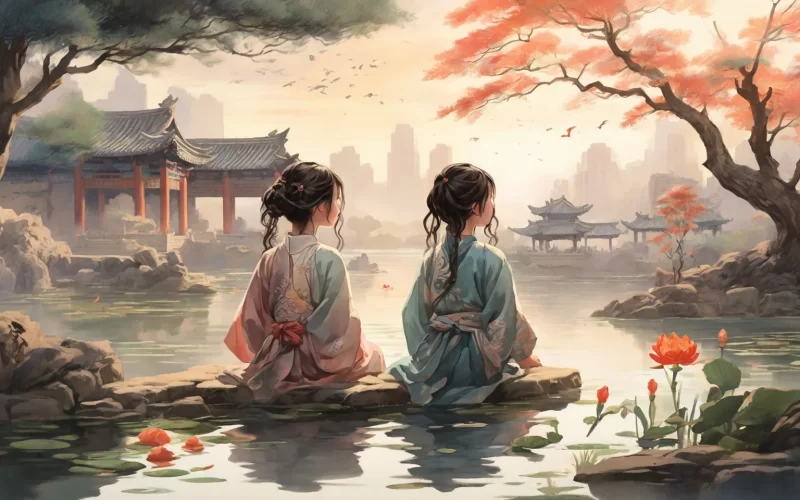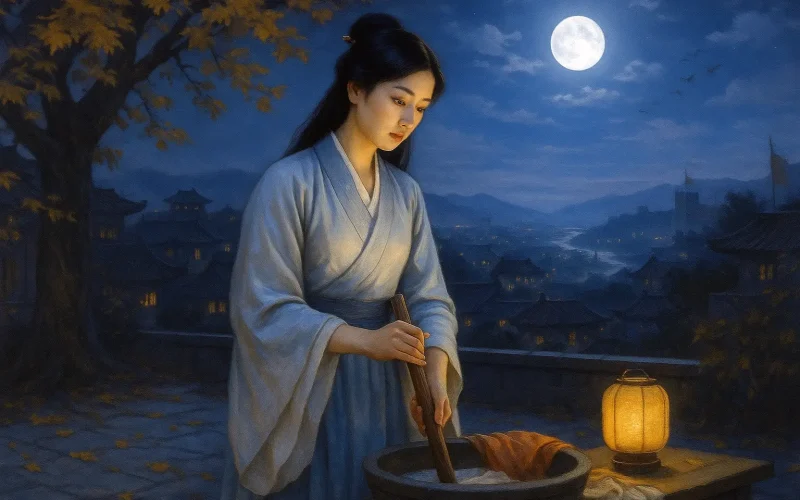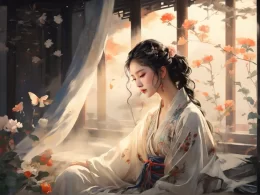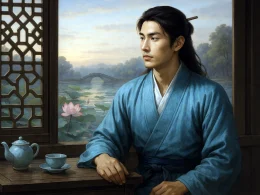My hair had hardly covered my forehead.
I was picking Bowers, playing by my door,
When you, my lover, on a bamboo horse,
Came trotting in circles and throwing green plums.
We lived near together on a lane in Ch'ang-kan,
Both of us young and happy-hearted.
...At fourteen I became your wife,
So bashful that I dared not smile,
And I lowered my head toward a dark corner
And would not turn to your thousand calls;
But at fifteen I straightened my brows and laughed,
Learning that no dust could ever seal our love,
That even unto death I would await you by my post
And would never lose heart in the tower of silent watching.
...Then when I was sixteen, you left on a long journey
Through the Gorges of Ch'ii-t'ang, of rock and whirling water.
And then came the Fifth-month, more than I could bear,
And I tried to hear the monkeys in your lofty far-off sky.
Your footprints by our door, where I had watched you go,
Were hidden, every one of them, under green moss,
Hidden under moss too deep to sweep away.
And the first autumn wind added fallen leaves.
And now, in the Eighth-month, yellowing butterflies
Hover, two by two, in our west-garden grasses...
And, because of all this, my heart is breaking
And I fear for my bright cheeks, lest they fade.
...Oh, at last, when you return through the three Pa districts,
Send me a message home ahead!
And I will come and meet you and will never mind the distance,
All the way to Chang-feng Sha.
Original Poem
「长干行」
李白
妾发初覆额,折花门前剧。
郎骑竹马来,绕床弄青梅。
同居长干里,两小无嫌猜。
十四为君妇,羞颜未尝开。
低头向暗壁,千唤不一回。
十五始展眉,愿同尘与灰。
常存抱柱信,岂上望夫台。
十六君远行,瞿塘滟滪堆。
五月不可触,猿声天上哀。
门前旧行迹,一一生绿苔。
苔深不可扫,落叶秋风早。
八月蝴蝶黄,双飞西园草。
感此伤妾心,坐愁红颜老。
早晚下三巴,预将书报家。
相迎不道远,直至长风沙。
Interpretation
This narrative poem by Tang dynasty poet Li Bai depicts the emotional journey of a young woman from Changgan—from childhood through marriage to her longing after her husband's departure. Changgan, a thriving residential area in ancient Nanjing since the Eastern Wu dynasty, became renowned during the Tang dynasty as a merchant hub. As commerce flourished, more merchant wives emerged in Changgan, their lives becoming poetic subjects, with this work being the most famous. Through vivid and delicate strokes, the poet portrays the young wife's profound longing for her husband, presenting a simple yet sincere love.
First Couplet: "妾发初覆额,折花门前剧。"
qiè fà chū fù é, zhé huā mén qián jù.
When my hair first covered my forehead, I'd pluck flowers and play before our gate.
The opening recalls childhood innocence. "Hair first covering forehead" indicates prepubescent youth, while "plucking flowers before the gate" depicts playful girlish charm.
Second Couplet: "郎骑竹马来,绕床弄青梅。"
láng qí zhú mǎ lái, rào chuáng nòng qīng méi.
You came riding bamboo sticks as horses, Circling my chair, tossing green plums in courses.
This portrays the boy's playful image on his bamboo "horse." The scene of children playing with plums later became the idiom "childhood sweethearts" (青梅竹马).
Third Couplet: "同居长干里,两小无嫌猜。"
tóng jū cháng gān lǐ, liǎng xiǎo wú xián cāi.
Growing up together in Changgan's quarter, Innocent hearts knew neither doubt nor barter.
This establishes their shared upbringing. "No doubt" reflects their pure, uncomplicated childhood bond.
Fourth Couplet: "十四为君妇,羞颜未尝开。"
shí sì wéi jūn fù, xiū yán wèi cháng kāi.
At fourteen I became your bride, Too shy to lift my eyes in pride.
Capturing the bashfulness of a young bride, this reflects traditional early marriages where fourteen-year-old brides were common.
Fifth Couplet: "低头向暗壁,千唤不一回。"
dī tóu xiàng àn bì, qiān huàn bù yī huí.
Head bowed toward the shadowed wall, Though called a thousand times, no recall.
Vivid psychological portrayal shows the bride's shyness through her refusal to turn when called.
Sixth Couplet: "十五始展眉,愿同尘与灰。"
shí wǔ shǐ zhǎn méi, yuàn tóng chén yǔ huī.
By fifteen I'd begun to smile, Vowing to stay through dust and trial.
The transition from shyness to smiling shows marital adjustment. "Dust and trial" symbolizes steadfast devotion.
Seventh Couplet: "常存抱柱信,岂上望夫台。"
cháng cún bào zhù xìn, qǐ shàng wàng fū tái.
Keeping faith like the pillar-holding lover, Why would I climb the husband-watching tower?
The "pillar-holding" allusion (to loyal lover Wei Sheng) contrasts with the "husband-watching tower" (symbol of waiting wives), expressing confidence in her husband's return.
Eighth Couplet: "十六君远行,瞿塘滟滪堆。"
shí liù jūn yuǎn xíng, qú táng yàn yù duī.
At sixteen you journeyed far, To Qutang's perilous Yanju Bar.
The shift to separation introduces sorrow. The dangerous Qutang Gorge foreshadows coming worries.
Ninth Couplet: "五月不可触,猿声天上哀。"
wǔ yuè bù kě chù, yuán shēng tiān shàng āi.
In May the rapids churn forbidden, While skyward howling monkeys cry unbidden.
The dangerous rapids and mournful monkey cries (traditional symbols of sorrow) amplify the wife's anxiety.
Tenth Couplet: "门前旧行迹,一一生绿苔。"
mén qián jiù xíng jì, yī yī shēng lǜ tái.
Before our gate, your footprints fade, Each one now mossy and decayed.
The moss-covered footprints poignantly symbolize time's passage and her loneliness.
Eleventh Couplet: "苔深不可扫,落叶秋风早。"
tái shēn bù kě sǎo, luò yè qiū fēng zǎo.
Too thick the moss to sweep away, Early autumn wind bears leaves astray.
The unswept moss represents preserved memories, while early autumn suggests her accelerated sense of time.
Twelfth Couplet: "八月蝴蝶黄,双飞西园草。"
bā yuè hú dié huáng, shuāng fēi xī yuán cǎo.
In August yellow butterflies pass, Flying paired through western garden grass.
The paired butterflies contrast with her solitude, intensifying her longing.
Thirteenth Couplet: "感此伤妾心,坐愁红颜老。"
gǎn cǐ shāng qiè xīn, zuò chóu hóng yán lǎo.
This sight breaks my heart in two, Sitting till my beauty fades from view.
Her sorrow feels aging, emphasizing prolonged loneliness.
Fourteenth Couplet: "早晚下三巴,预将书报家。"
zǎo wǎn xià sān bā, yù jiāng shū bào jiā.
When you leave the Three Gorges someday, Send word home without delay.
Her urgent plea for notification shows desperate anticipation.
Fifteenth Couplet: "相迎不道远,直至长风沙。"
xiāng yíng bù dào yuǎn, zhí zhì cháng fēng shā.
To meet you I'll count no mile, Even to Changfengsha's distant aisle.
The concluding vow to travel any distance demonstrates profound devotion, elevating the poem's emotional climax.
Comprehensive Analysis
This lyrical narrative in feminine voice recounts childhood play, marital bliss, and post-separation longing. The natural progression—from innocent memories through shy newlywed days to deepening loneliness—vividly traces the woman's psychological journey.
The poem excels in emotional subtlety: childhood "green plum" memories establish pure affection; bridal shyness shows maturation; separation brings intensifying sorrow. Particularly powerful is "moss too thick to sweep," where imagery conveys accumulated longing. The finale's promise to meet "even to distant Changfengsha" blends tenderness with heartbreaking devotion.
Li Bai successfully creates an authentic, steadfast female character whose love transcends time and space. The natural language, infused with folk song qualities, combines everyday charm with artistic power, leaving readers deeply moved.
Artistic Innovations
- Integrated narrative progression: The first-person recollection moves seamlessly from childhood play to marital life to separation, with each stage deepening emotional complexity and character authenticity.
- Psychological realism: Exquisite depictions like "head bowed toward the shadowed wall" capture bridal shyness, while "moss-covered footprints" symbolize preserved memories with poignant subtlety.
- Folk-inspired musicality: Adopting six-dynasties folk song techniques, verses like "riding bamboo stick horses" feature rhythmic, rhyming language that enchants when recited aloud.
- Symbolic natural imagery: Environmental elements—dangerous rapids, paired butterflies, unswept moss—become emotional metaphors that amplify the speaker's inner world without explicit statement.
Insights
The poem's depiction of steadfast love offers timeless wisdom: true affection requires loyalty that withstands separation and time. In our era of instant gratification, this reminds us that meaningful relationships demand patience and commitment.
Moreover, the young wife's retrospective appreciation of past happiness warns against taking present companionship for granted. Her story urges us to cherish loved ones before absence makes the heart grow fonder in hindsight.
While reflecting its historical context of female devotion, the poem's core values—fidelity, emotional resilience, and the courage to wait—remain universally relevant. The wife's character ultimately teaches that love's deepest measure isn't passion's intensity but endurance's quiet strength.
Poem translator
Kiang Kanghu
About the poet

Li Bai (李白), 701 - 762 A.D., whose ancestral home was in Gansu, was preceded by Li Guang, a general of the Han Dynasty. Tang poetry is one of the brightest constellations in the history of Chinese literature, and one of the brightest stars is Li Bai.












